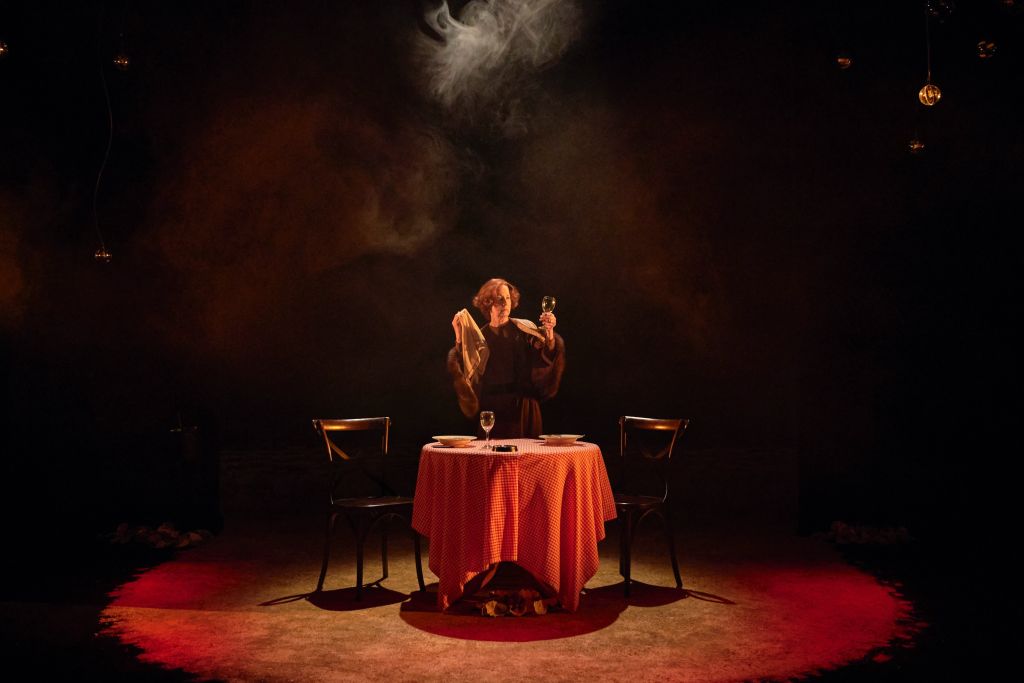The set at the Arcola for Frank McGuinness’s Dinner with Groucho naturally features a table with two place settings and a backdrop of clouds in a blue sky. Overhead are pendant globe lights that will transform into stars. But the floor is a key feature too, covered in sawdust.
For those who can’t see it from their seats, the playwright has usefully included a line about this being a “sawdust restaurant”. If you happen to notice that there are oyster shells scattered over it too, and nod in recognition, you will probably feel less adrift given that the oyster shells and sawdust reference comes from T S Eliot’s poem The Love Song of J Alfred Prufrock. Even so, are you confident you know what you are watching?
This isn’t made-up fan fiction: the two men did meet. Eliot was an admirer of Groucho Marx and vice versa, and they corresponded regularly, finally getting together in 1964, the year before the poet’s death. McGuinness seems to be suggesting a commonality between them. Onstage they exhibit characteristics we recognise from their work — Groucho, the adroit player with words and absurd conceits; Eliot, the lofty man of belles lettres who feels the weight of the world and senses his course is run. And in their exchanges they play with the idea of becoming the other.
But what is this restaurant where they are meeting? Its Proprietor, an elegant, imperious woman who talks to them as an equal, has evoked their presence in the first scene with what seems like an incantation — “Bones, rest quietly,/ earth, lie lightly,/ But now — rise, rise.” It’s like Prospero in The Tempest summoning Ariel, one of Eliot’s favourite quotable characters. Or a medium starting a seance. Are the two men manifestations? Is the Proprietor a shade too? Are they ever going to get any food in this joint?  Loveday Ingram’s production handles the material with due regard for its surrealism. It’s a beautifully designed space (set by Adam Wiltshire, lighting by Paul Keogan, costumes by Joan Bergin) where invisible champagne makes a sound as it is pretend-poured and the men slurp non-existent soup. They are the only customers; even so, their steaks never arrive. As they wait, Eliot does magic tricks, even produces a rubber chicken; Groucho recites a Marianne Moore poem. They dance the Charleston and sing the music-hall songs they both love, joined by the Proprietor in a rendition of Marie Lloyd’s signature song, "The Boy in the Gallery". Eliot makes a joke about the chicken soup not being duck soup, only to have it parried and riposted as a different joke by his dining partner. Groucho in turn expresses his love of Eliot and Shakespeare. Handy-dandy, which is which?
Loveday Ingram’s production handles the material with due regard for its surrealism. It’s a beautifully designed space (set by Adam Wiltshire, lighting by Paul Keogan, costumes by Joan Bergin) where invisible champagne makes a sound as it is pretend-poured and the men slurp non-existent soup. They are the only customers; even so, their steaks never arrive. As they wait, Eliot does magic tricks, even produces a rubber chicken; Groucho recites a Marianne Moore poem. They dance the Charleston and sing the music-hall songs they both love, joined by the Proprietor in a rendition of Marie Lloyd’s signature song, "The Boy in the Gallery". Eliot makes a joke about the chicken soup not being duck soup, only to have it parried and riposted as a different joke by his dining partner. Groucho in turn expresses his love of Eliot and Shakespeare. Handy-dandy, which is which?
McGuinness clearly had a terrific time writing the piece. He has come up with some choice repartee, as when the Proprietor, as if channelling Marx Bros regular Margaret Dumont, exclaims, “I didn’t come here to be insulted.” Groucho: “Where do you usually go?” Proprietor: “The Royal Albert Hall.” There is also a wonderfully silly section where the two men discuss King Lear (real name Bernie, according to Groucho) and another when the Proprietor finally presents them with the outrageous bill. But in between the set pieces the rat-a-tat dialogue can become thin and tedious - which I find can also happen in Marx Brothers scripts.
The crack cast do what they can to bundle the pace along. The versatile Ian Bartholomew makes Groucho a simpatico fellow, capturing his mannerisms and ludicrous eyebrows to a T, though sometimes forgetting to press the Noo Yoik Accent pedal so that only certain woids stand out. The esteemed RSC actor Greg Hicks, by contrast, is a patrician Eliot in a natty three-piece suit, oozing seigneurialism, though his speech mannerisms, too, veer off course at times. It’s a strong, no-nonsense voice, very British, not the voice on Eliot’s recordings, which is mid-Atlantic and at times almost tremulous with despair. It's hard to believe he hails from St Louis. As the Proprietor, Ingrid Craigie (pictured above) holds her own, a spirited spirit-master as wayward as her establishment.
Does being able to spot the Eliot references actually foster an understanding of what’s going on? I don’t think so. I registered the “scuttling” ragged claws Groucho mentions as a quote from Prufrock and the rumination about time past, present and future being the same from The Four Quartets. Well done, me — but so what? And were these implanted in the text by McGuinness for his own amusement or is there a point to them? If the latter, it’s not easy to spot.
Best, I decided, to view the piece as an extended poem rather than a conventional drama and not be distracted by worrying about missing something. You can always get a copy of the playscript and maybe keep Eliot’s poems to hand as well, for a retrospective assessment. But that’s more like homework than playgoing.















Add comment